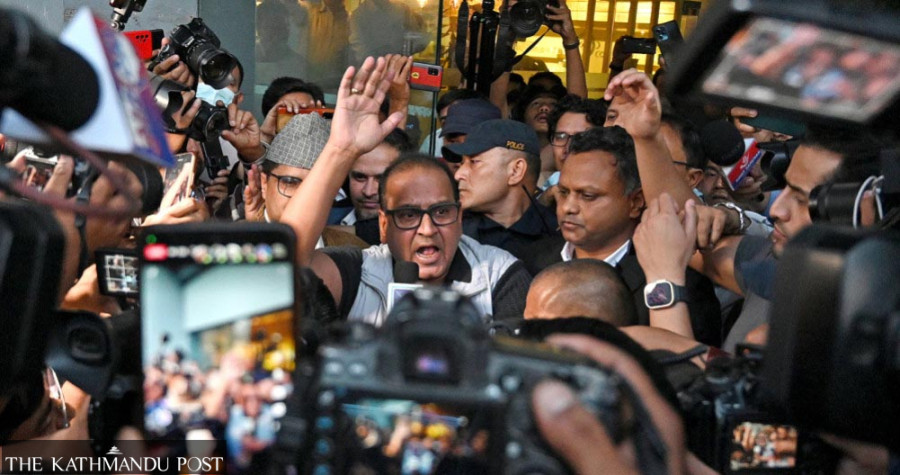Columns
Prachanda, do you hear us?
It is striking that even the monarchists hadn’t quite harassed and intimidated KMG like this.
Mitra Pariyar
“Harvard, do you hear us?” Shruthi Kumar, a graduating student, raised this poignant question during her off-script speech at the Harvard University Commencement on May 23. She furiously upbraided the elite school (like many other college campuses in the US) for trying to silence pro-Palestine voices on campus. Protesting against what many consider the excesses of this government on the owner of Kantipur Media Group, Kailash Sirohiya, I want to ask: Prime Minister, do you hear us?
Whack one to silence all
Sadly, the crackdown on the KMG publisher on May 21, 2024, resembles the action of the then autocratic King Gyanendra Shah in early June 2001. Sirohiya, Editor-in-Chief Yubaraj Ghimire and director Binod Raj Gyawali were detained for nine days and charged with sedition after Kantipur Daily published Baburam Bhattarai’s article. Bhattarai was the principal ideologue of the armed Maoist insurgency—which was then raging across the country—led by none other than the incumbent Prime Minister Pushpa Kamal Dahal.
If Dahal still has any sense of honesty and morality left in him, he should feel humiliated to have the same KMG owner booked, king-style, on some flimsy allegations of acquiring fake or multiple citizenships decades ago. Even the monarchist forces hadn’t quite harassed and intimidated the publishing house and its chief executive like this.
Most observers, including reputed international bodies like Amnesty International and the International Federation of Journalists, smell a rat in this incident. Although Sirohiya has been arrested ostensibly for allegedly falsifying his citizenship certificate, the real purpose seems to be to silence the criticism of the government’s important ministers and curb press freedom.
The government appears to think that once you whack the main guy hard, all the group members will automatically fall in line. The amount of success this endeavour will gain is for the future to tell. However, the potential repercussions may outweigh its achievements.
Defence of democracy
It is widely suspected that the arrest is more of a personal vengeance, of a nasty vendetta by the irritated rulers. KMG seems to have been punished by the authorities for conducting deep research on Home Minister Rabi Lamichhane’s alleged involvement in the embezzlement of large sums of funds from various cooperatives in many towns. This made KP Oli and Dahal uncomfortable as their defence for Lamichhane appeared increasingly untenable, which meant the coalition’s future became uncertain.
I have nothing to do with personal tussles amongst people in power; Sirohiya, too, is not without access to power. Nevertheless, I am concerned by the latest developments because I greatly value press freedom. Independent media is a pillar of democracy. Democracy suffers damage once that independent space shrinks.
It doesn’t matter whether one loves or hates KMG. I have my grievances against it and have publicly expressed some of them. I want it to be more inclusive and accommodating of diverse voices. It should do more to support the cause of lower classes, castes and neglected regions and religions.
However, this is not the time, as some people are doing, to vilify and pour anger at KMG and discuss its weaknesses and limitations. This would only serve the purpose of the parties and leaders in power who are intent on sapping the freedom of expression for their own vested interests.
I warn people against the coalition leadership’s potentially dangerous road towards greater intolerance and authoritarianism. I think the opposition’s—Nepali Congress party—assertion along this line is timely and appropriate. We need to be vigilant about the communists and the populists colluding to shrink the democratic space. Responsible citizens should always put their finger in the dyke.
Demoralising businesses
The rulers’ ultimate gain from this undue punishment of Nepal’s top media entrepreneur is unknown, but they have already alarmed the business community. This is particularly not good in a persistently failing economy.
Lowering businesspeople’s morale is the last thing we need right now when small and medium businesses are rapidly shutting down and thousands of citizens are flying abroad to work in the sweatshops of Malaysia and the Gulf states every day to keep their families alive. Does this latest action encourage people to invest or divest from the country?
Doesn’t the scandalous affair of harassing a long-established and esteemed businessman based on his citizenship potentially repel possible investors from non-resident Nepali (NRN) communities? Is the government aware of this potential fallout now and in the future?
Offensive to Madheshis
The government has not only arrested Kailash Sirohiya but also made a deliberate attempt to create a narrative that somehow he’s a potential foreigner illegally running media companies in Nepal. This has sent a wrong signal to the public and deeply offended the Madheshi community.
Nepal is highly casteist and racist. People of the southern plains bear the brunt of hill racism. They are often seen as outsiders. This stems from a longstanding policy of the ruling elites over a long period.
Hundreds of thousands of Madhesis, many of them Dalits, are not only landless but also stateless. They’ve been denied citizenship even after living in the country for many generations. Frustratingly, even those Madheshis who have lived here for long and significantly contributed to society, find their belonging to the land constantly questioned.
If someone like Sirohiya, who owns the largest media house in the country, and has worked to restore democracy and human rights for decades, finds himself suspected as an illegal alien, can anyone imagine the plight of ordinary Madheshis? Isn’t this shameless behaviour of the Nepali state? Has the hill racism become worse in the republican era?
Concerned leaders and their blind supporters may pretend not to know anything, but people are keenly watching. Such a racist attitude of the state expressed overtly or covertly, does not bode well for our peaceful and prosperous future.
Today, social media is abuzz with highly critical and racist comments against Sirohiya. The smear campaign against him has peaked. Even some Dalits have criticised me for supporting whom they say is a member of the “media mafia”, of an “Indian agent”. This is deeply disturbing.
To conclude, I don’t know Kailash Sirohiya personally, but I don’t need to know him. Nor do I declare him guilty or innocent of the charges; that’s for the judges to decide.
In any case, my observations don’t change as my worry is only about the attack on press freedom for narrow political interests and the implicit racist attitude of the ruling elites. I’d be equally outraged if an owner, editor, or journalist of any other media corporation were similarly targeted.
Sirohiya, mentioned in this article, is the publisher of the Post. The views expressed are the author’s own.




 11.12°C Kathmandu
11.12°C Kathmandu















